Originally published March 2, 2021 , updated on August 1, 2025
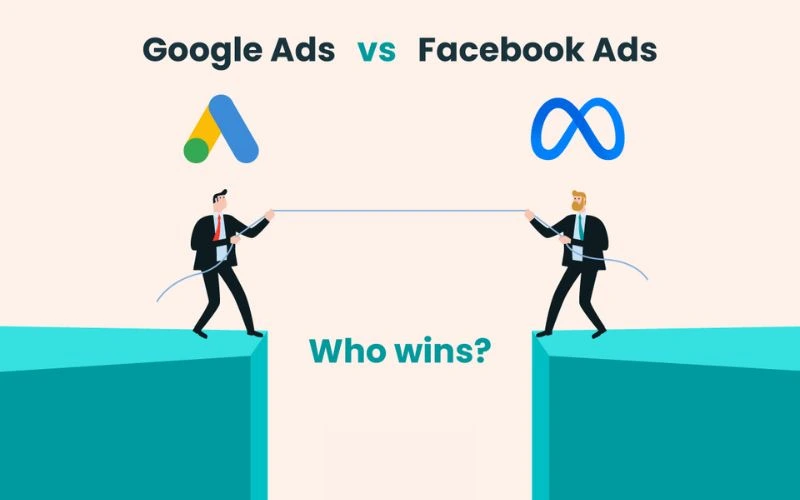
Digital advertising plays a crucial role in helping businesses reach their target audience and drive sales. But if you’re a small business and budgets are tight, you need to decide where your online advertising budget should go. In fact, this applies to any business. So the big question is: Should you use Facebook advertising or Google Ads? Both platforms are powerful, but they work in very different ways.
So, how do you know which one is right for your business?
In this article, we’ll break down the differences between the two, what each of their strengths and weaknesses are, and which platform to use according to your objectives. Whether you’re running ads yourself or working with a Google or Facebook advertising agency, you’ll walk away with a clear understanding of which platform (or combination) will work best for you.
What Are Google Ads and Facebook Ads?
Before we compare them, let’s start by explaining what a Google and Facebook ad is.
A Google Ad is a paid ad that appears on Google’s search results, websites, YouTube, and other platforms in Google’s network. Businesses use Google Ads to target people who are searching for specific keywords related to their products or services.
For example, if someone searches “best running shoes,” a shoe brand’s ad may appear at the top of the search results.
A Facebook Ad is a paid ad that appears on Facebook, Instagram, Messenger, and the Meta Audience Network. Instead of targeting people based on searches, Facebook Ads focus on reaching users based on their demographics and online behavior.
For example, if someone follows fitness pages or engages with workout content, they might see ads for gym gear or online coaching, even if they weren’t actively searching for it.
The Differences Between Google Ads and Facebook Ads
So now we know what they are, let’s go into detail about how they differ. Each offers unique advantages tailored to your specific marketing objectives.
Intent vs. Discovery
Google Ads operates on a pay-per-click (PPC) model where advertisers pay a fee each time someone clicks on their ad. These ads target users who are actively searching for specific products or services. This means your ads appear to individuals with a clear intent, making them more likely to click. On the other hand, Facebook ads are designed for audience discovery. Facebook ads showcase your offerings to users based on their interests and demographics, even if they’re not actively searching for your product. This approach is excellent for building brand awareness and reaching potential customers who might not yet know they need your product.
Targeting Capabilities
Both platforms let you target the right audience, but they do it differently. Google Ads works by letting advertisers bid on keywords so your ad shows up when someone searches for those terms. Which is perfect for reaching people who are ready to buy. Facebook Ads, on the other hand, use data about users’ demographics and online behavior to show ads to people who are most likely to be interested. This makes it great for building awareness and reaching specific groups.
Ad Formats
Google Ads primarily features text-based ads that appear alongside search results. While they include site links or call-to-actions, the format remains simple and text-focused. Facebook Ads, however, are inherently visual. Advertisers can utilize images, videos, carousels, and interactive formats to engage users within their social feeds, making the ads more immersive and engaging.
Cost Considerations
Cost-per-click (CPC) (how much that click ultimately costs you) can vary between the two platforms. Generally, Facebook Ads tend to have a lower CPC compared to Google Ads, making them a cost-effective option for smaller businesses aiming for the best bang for their buck. However, the higher CPC of Google Ads often correlates with higher conversion rates due to the intent-driven nature of its users.
The Strengths & Weaknesses of Google Ads
One of the biggest advantages of Google Ads is that they target people actively searching for products or services. This makes it a great tool for driving conversions. Plus, with access to Google Search, YouTube, Gmail, and the Display Network, businesses can reach a massive audience. A Google advertising agency can also help refine keyword targeting, location, and demographics for better results.
However, Google Ads can be expensive, especially in competitive industries. It also requires ongoing optimization to stay effective. If brand awareness is the goal, using Facebook advertising services may be a better option.
Strengths & Weaknesses of a Facebook Advertising
| Strengths | Weaknesses |
| Reaches highly targeted audiences based on interests and demographics. | Users aren’t actively searching for products, so Facebook Ads may not immediately drive sales. |
| Places your brand in front of potential customers before they even start searching. | Privacy settings and algorithms changes can affect ad targeting. |
| Ads are visually engaging, with images, videos, and interactive formats that boost brand awareness. | Requires continuous optimization to maintain effectiveness. |
| Effective for increasing engagement and brand visibility. | May need expert support from Facebook Advertising services to navigate the platform complexity. |
| Campaigns can be fine-tuned by a Facebook advertising agency for better results. | Less intent-driven compared to Google Ads, which targets users actively searching for solutions. |
What To Consider When Creating a Google Ad
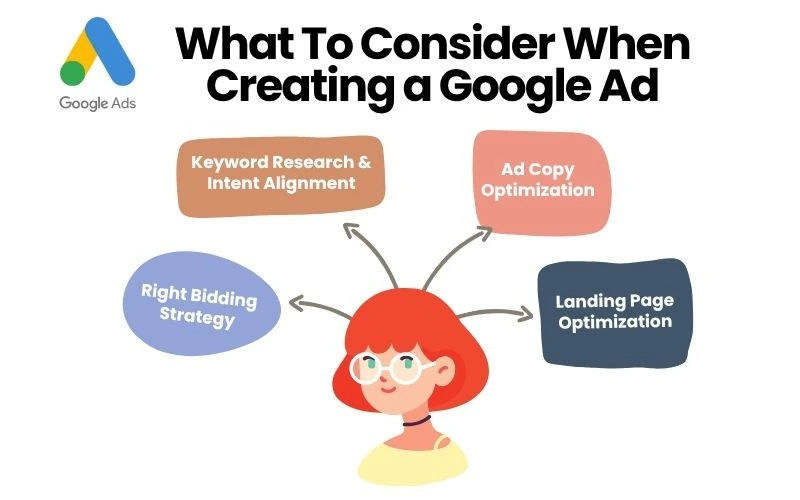
Creating an effective Google Ad isn’t just about showing up in search results. It’s about making sure the right people see it and take action. Here’s what you should focus on:
Keyword Research & Intent Alignment
Start with solid keyword research. Choose terms that match what your audience is actively searching for. A Google advertising agency can help identify high-intent keywords. These are the ones that show people are ready to buy, not just browsing.
Writing Compelling Ad Copy & Using Ad Extensions
Your ad copy should be clear, engaging, and to the point. Highlight what makes your product or service stand out. Your ad can also have extensions. This is where you add extra details like phone numbers, reviews, or additional links, making your ad more clickable.
Setting the Right Bidding Strategy
Google Ads works on a bidding system, so it’s important to set the right strategy. If your goal is brand awareness, you might focus on impressions. If it’s conversions, you might prioritize cost-per-click (CPC). A Google Ads services expert can help optimize this.
Landing Page Optimization for Conversions
Your ad should lead to a landing page that’s fast, user-friendly, and relevant. If visitors don’t find what they expect, they’ll leave. And your ad spend has been wasted. Keep it simple, relevant, persuasive, and easy to navigate.
What To Consider When Creating Facebook Ads
In a similar vein, a successful Facebook advertising strategy isn’t just about putting any random ad onto Facebook and hoping for the best. You need to ensure it reaches the right people and grabs their attention. Here are some tips:
Define the Right Audience Segments
Facebook Ads let you target users based on interests and demographics. The more specific you are, the better. A Facebook advertising agency can help fine-tune audience segments. This ensures your ads reach people most likely to engage or buy.
Choose Engaging Visuals & Compelling Ad Copy
How often do you randomly scroll down your Facebook feed? You need to create an ad that will stop people from scrolling and grab their attention. Facebook is a visual platform, so eye-catching images and videos are a must. Pair them with clear and persuasive ad copy that speaks directly to their needs. Keep it simple but impactful.
A/B Test Different Ad Creatives & Formats
Not sure what works best? Test it! Try different images, headlines, and call-to-action buttons to see what drives the most engagement. Various Facebook advertising services allow you to compare performance and optimize over time.
Optimize for Engagement & Conversions
Make sure your ad aligns with your goal. Whether that is website clicks, video views, engagement, or direct sales. Experiment with different placements, formats, visuals, and CTA buttons to get the best results.
Examples of Successful Google and Facebook Ad Campaigns
Now that we know more about the two platforms, let’s look at some previously successful campaigns in action.
Google Ad Campaigns
Dollar Shave Club’s $9 Starter Set Promotion
This campaign was so simple but so effective. Dollar Shave Club is a US-based company that sells subscriptions for shaving sets. This particular Google ad campaign was promoting their $9 starter shave set. The ad directed users searching for affordable shaving solutions to a dedicated landing page for this particular promotion. By streamlining the customer journey, users were not distracted by any of the other offerings, leading to increased conversions.

We love a sense of humor! Especially when it delivers results. Semrush, a digital marketing tool, used Google Ads to bid on competitor keywords. When users searched for similar tools, Semrush’s ads appeared. The ad was saying there are alternatives, but here’s why we are better. This strategy caught the attention of potential customers exploring alternatives.
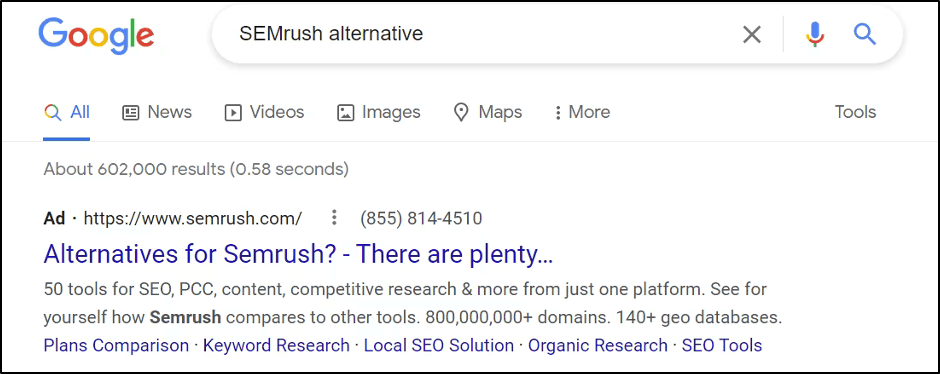
Facebook Ads Campaigns
Pura Vida’s Lifestyle-Centric Advertising
Pura Vida Bracelets used the visual nature of Facebook to showcase their products in aspirational lifestyle settings. By targeting users interested in fashion and accessories, they effectively increased brand awareness and drove sales through engaging imagery. They also kept the copy short and catchy.
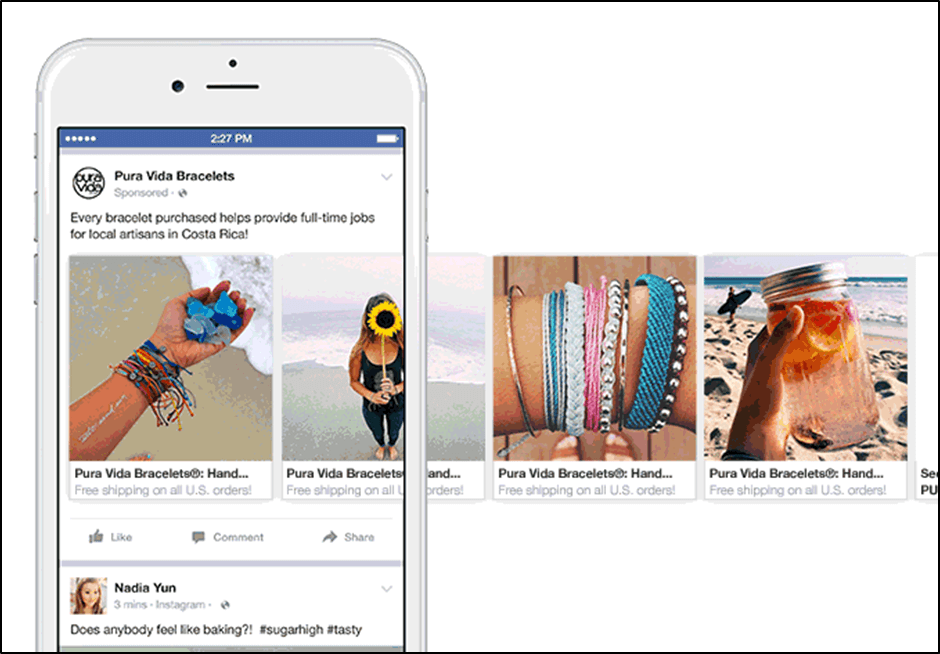
Sephora’s Video Tutorials
Sephora utilized Facebook video ads to offer makeup tutorials featuring their products. These educational and engaging videos not only showcased their offerings but also provided value to viewers, leading to increased engagement and product purchases. According to Sproutsocial, this ad resulted in a 41% higher click-through rate than other ads.
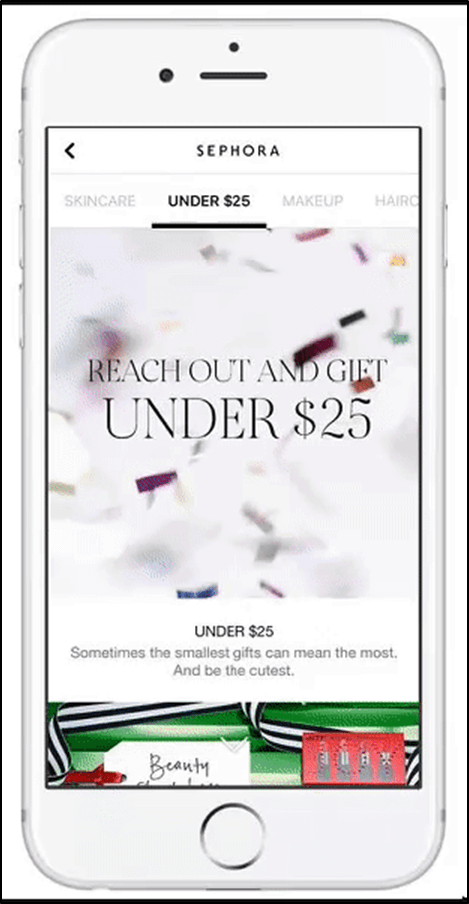
Facebook Ads vs. Google Ads: When To Use Each
As we have already mentioned, both platforms have their place, but choosing the right one depends on what you are trying to achieve.
When to Use Google Ads Services:
If you want to target people actively searching for a solution, Google Ad Services are the way to go. Google Ads work best for businesses that solve a specific problem. Whether it’s a plumber for an emergency repair or a software tool for productivity. Because users are searching with intent – meaning they want an answer now. And because of this, these ads often lead to higher conversions. A Google advertising agency can help optimize paid search campaigns for maximum results, making Google Ads ideal for measurable, conversion-driven goals.
When to Use Facebook Advertising Services:
If your goal is brand awareness or reaching new audiences, a strong Facebook advertising strategy is essential. Facebook Advertising services work well for visually engaging products. Think fashion, fitness, travel, or lifestyle aspirations. Areas where storytelling makes an impact. They’re also great for retargeting, meaning you can show ads to users who’ve already interacted with your brand. A Facebook advertising agency can help craft eye-catching campaigns that build connections and long-term customer loyalty.
How To Use Google Ads and Facebook Ads Together
For the best results, many businesses use both platforms together to form part of their paid media strategy. This creates a powerful, full-funnel strategy.
You can start by running Google Ads to capture high-intent search traffic, then retarget those visitors with Facebook advertising services to keep your brand top of mind.
Alternatively, use Facebook advertising services to build brand awareness and interest, so when users search later, your Google Ads capture that demand.
Don’t forget to leverage audience insights from both platforms to refine targeting. Facebook’s interest-based data combined with Google’s search intent can improve ad performance. Finally, run A/B tests across both platforms to see which creative and messaging drive the best results.
Final Verdict: Which Is Better?
The truth is there’s no one-size-fits-all answer. Google Ads and Facebook Ads serve different purposes but work best when used together. However, if you need immediate conversions from people actively searching for solutions, Google Ads Services are the way to go. If you want to build brand awareness, engage new audiences, build a community, and retarget potential customers, Facebook advertising services are essential.
The best approach? Use both strategically. A Google advertising agency can help fine-tune Google Ad campaigns, while a Facebook advertising agency can craft engaging visuals and maximize audience targeting. When combined, they create a powerful, full-funnel marketing strategy that maximizes results.
Do you need help with Facebook advertising services or Google Ads services – or both? Reach out to the team at Goodman Lantern. We’d love to help.





















